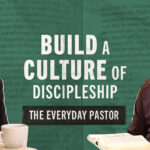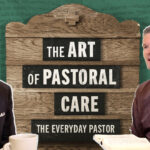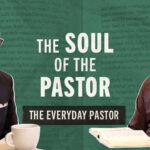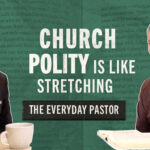On My Shelf helps you get to know various writers through a behind-the-scenes glimpse into their lives as readers.
I asked D. A. Horton—author, pastor of Reach Fellowship in California, and chief evangelist for the Urban Youth Workers Institute—about books he re-reads, biographies and autobiographies that have affected him, books that have shaped his understanding of racial justice, and more.
What are some books you regularly re-read and why?
Mañana: Christian Theology from a Hispanic Perspective by Justo González
I hear González’s words speak to me holistically as a Latino. He unpacks the Scriptures through a cultural lens Latinos understand while writing with an academic and poetic balance.
Humility: True Greatness by C. J. Mahaney
Mahaney’s work annually provides me with a biblical and practical rubric to gauge my need for humility. It fuels my heart to live out Isaiah 66:2.
Gaining by Losing by J. D. Greear
Knowing J. D. personally, I bear witness to him living out what Gaining by Losing presents, and I’m challenged to follow his lead in seeing the idols in my heart destroyed as I seek to live in obedience to Christ.
These three books point my eyes to Christ and his Word, while helping me navigate the tensions of serving as a Latino pastor who daily fights pride and is called to live on mission for God’s glory.
What biographies or autobiographies have most influenced you and why?
I’m sure this list will confuse some and possibly offend others, but it’s simply a reflection of the story God is writing in my life.
Holler If You Hear Me, a biography of Tupac Shakur by Michael Eric Dyson
Tupac’s sharp assessment of society’s ills has always astounded me. At a young age he made an accurate diagnosis of the moral decay in urban America but failed to offer a solution. He drew me in when I was young because he always included the Latino (in my case, Mexican) struggle alongside the struggle of African Americans and other minorities. I wish I could have dialogued with him about Scripture’s metanarrative and how the gospel provides the pathway forward to a new creation, addressing every problem his diagnosis covered. I almost wrote my PhD dissertation on Tupac’s social diagnosis and how the church can respond to it with a gospel-saturated plan to balance preaching the salvific atonement of Christ with engaging in social action.
The Black Hand: The Story of Rene ‘Boxer’ Enriquez and His Life in the Mexican Mafia by Chris Blatchford
Planting a church in Los Angeles requires an understanding of the multi-generational gang culture. Rene’s story provides an insider’s view of the wicked world of gangs, but also explains how gangs’ organizational structure, adherence to a code of ethics, and familial structure provide missionaries with inroads for gospel conversation.
A Place at the Table: George Eldon Ladd and the Rehabilitation of Evangelical Scholarship in America by John A. D’Elia
My heart broke as I read Ladd’s biography. His pattern of prioritizing his work over his wife and children scares me because I see the propensity for me to do the same. The crushing blow he took from one critical review of his magnum opus shows the depth of depression theologians can sink to if our identity is wrapped up in being accepted by colleagues and experts.
No Compromise: The Life Story of Keith Green by Melody Green and David Hazard
Many in my generation (millennials) have no idea who Keith Green is. I was blessed to be around older men who would play his music to me in my teens. His passion to see the lost come to know Christ was coupled with a desire to meet the needs of the outcasts of his day (teenage hippies). He had a prophetic gift in music writing, speaking truth boldly to correct false doctrines in both the church and the world. His heart bled compassion for those around him, and I pray to have half his compassion for the lost world around me.
Just As I Am: The Autobiography of Billy Graham by Billy Graham
My mother embraced Christ as Savior at the Kansas City, Missouri, Billy Graham crusade in 1978. I’ve always been curious about Graham’s ministry, and his autobiography helped me understand his methods and the message he proclaimed.
What books have most shaped your understanding of racial justice?
There are many. Before I drop a list I want to qualify it by saying to evangelicals: I gave a talk at the ERLC Summit outlining three practical steps we can take to better handle conversations on racial justice. The first step is to become more intellectually equipped, meaning we need to read works by authors of color, women, and non-believers if we want to critically engage this complex conversation.
That said, here’s a short list of resources that have given me a better understanding of racial justice:
Aliens in a Promised Land: Why Minority Leadership Is Overlooked in White Christian Churches and Institutions by Anthony Bradley
The Next Evangelicalism: Freeing the Church from Western Captivity by Soong-Chan Rah
Mañana: Christian Theology from a Hispanic Perspective by Justo L. González
The New Jim Crow by Michelle Alexander
One New Man: The Cross and Racial Reconciliation in Pauline Theology by Jarvis Williams
When Work Disappears: The World of the New Urban Poor by William Julius Wilson
Code of the Street: Decency, Violence, and the Moral Life of the Inner City by Elijah Anderson
The Kerner Report by The National Advisory Commission on Civil Disorders
Working Toward Whiteness: How America’s Immigrants Became White: The Strange Journey from Ellis Island to the Suburbs by David R. Roediger
Racism without Racists: Color-blind Racism and the Persistence of Racial Inequality in America by Eduardo Bonilla-Silva
What are you learning about life and following Jesus?
The closer I get to Jesus, the more I need him. Re-entering the pastorate has grounded me in relationships that call me to deeper levels of accountability, fellowship, and trust. I’m learning how to protect those I love from my sin by walking in transparency with them. I’m learning to take what I glean from my personal time with Jesus into my conversations with my wife, children, fellow pastors, and the men I’m discipling. This process has provided me with a strong safety net of hands who hold my reputation.
It’s easier to see the areas God wants you to grow in when you have multiple sets of caring eyes watching your life and doctrine closely. I strive to watch my life and doctrine, but I’m limited and biased due to my flesh. As I pursue Christ, he’s given me a desire to pursue his Word (Scripture), his body (the local church), and his mission (God receiving glory), living in dependence on him to sustain me by the Spirit who lives inside of me.
Also in the On My Shelf series: Darryl Williamson • Carl Ellis • Owen Strachan • Thomas Kidd • David Murray • Jarvis Williams • Gracy Olmstead • Matthew Hall • Drew Dyck • Louis Markos • Ray Ortlund • Brett McCracken • Mez McConnell • Erik Raymond • Sandra McCracken • Tim Challies • Sammy Rhodes • Karen Ellis • Alastair Roberts • Scott Sauls • Karen Swallow Prior • Jackie Hill Perry • Bruce Ashford • Jonathan Leeman • Megan Hill • Marvin Olasky • David Wells • John Frame • Rod Dreher • James K. A. Smith • Randy Alcorn • Tom Schreiner • Trillia Newbell • Jen Wilkin • Joe Carter • Timothy George • Tim Keller • Bryan Chapell • Lauren Chandler • Mike Cosper • Russell Moore • Jared Wilson • Kathy Keller • J. D. Greear • Kevin DeYoung • Kathleen Nielson • Thabiti Anyabwile • Elyse Fitzpatrick • Collin Hansen • Fred Sanders • Rosaria Butterfield • Nancy Guthrie • Matt Chandler
Browse dozens of book recommendations from The Gospel Coalition’s leaders and sign up your church at Hubworthy.
“The Most Practical and Engaging Book on Christian Living Apart from the Bible”
 “If you’re going to read just one book on Christian living and how the gospel can be applied in your life, let this be your book.”—Elisa dos Santos, Amazon reviewer.
“If you’re going to read just one book on Christian living and how the gospel can be applied in your life, let this be your book.”—Elisa dos Santos, Amazon reviewer.
In this book, seasoned church planter Jeff Vanderstelt argues that you need to become “gospel fluent”—to think about your life through the truth of the gospel and rehearse it to yourself and others.
We’re delighted to offer the Gospel Fluency: Speaking the Truths of Jesus into the Everyday Stuff of Life ebook (Crossway) to you for FREE today. Click this link to get instant access to a resource that will help you apply the gospel more confidently to every area of your life.

































